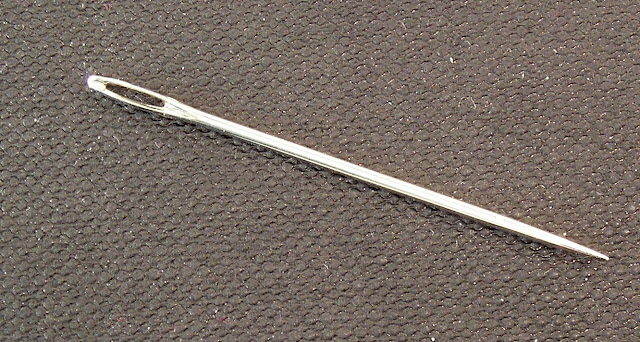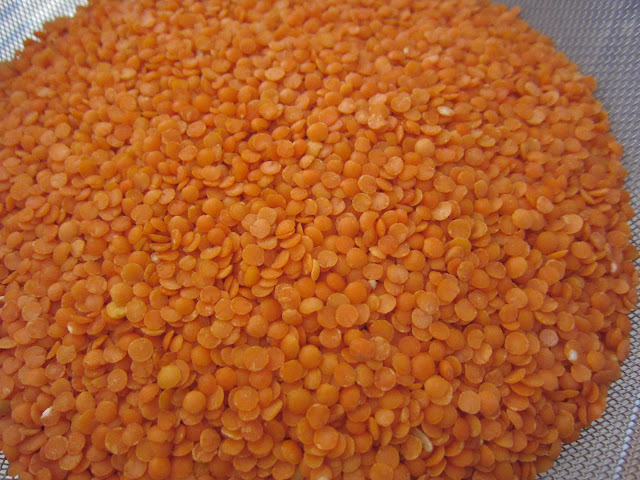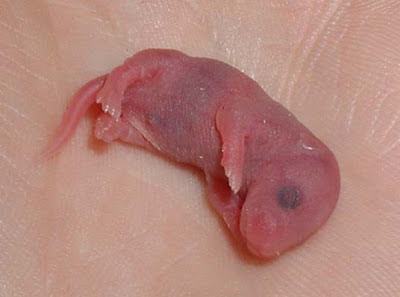 |
| Photo Source |
Saturday, 23 February 2013
DID YOU KNOW ...? (60)
Wednesday, 20 February 2013
VINEGAR FOR FROST-FREE CAR WINDOWS
Here in Australia, we are far from having frosty nights. In fact, we are currently rather worried about keeping ourselves safe from fire dangers due to the extreme and continuous heat in most parts of the country. However, I know my readers are not only from Australia and also, this is a tip that needs to be noted for the days when it will become handy even if it is not now.
If you would like to prevent your car windows from frosting, coat them with a vinegar solution overnight (3 parts white distilled vinegar to 1 part water).
Have a safe day!
If you would like to prevent your car windows from frosting, coat them with a vinegar solution overnight (3 parts white distilled vinegar to 1 part water).
Have a safe day!
Saturday, 16 February 2013
DID YOU KNOW ...? (59)
 |
| Photo Source |
Wednesday, 13 February 2013
RECIPE: Red Lentil Koftas
 |
| Red lentil koftas |
Whether you are a vegetarian, vegan or an omnivore, this easy to make, healthy and filling recipe is something that you will enjoy and benefit from. It makes a great high protein and fiber dish for your family, or for your guests. It can stay in the fridge for a few days after you make it which makes it even more desirable especially if a busy day is ahead of you or you are a person who would like to get organised in advance when hosting.
Ingredients:
 |
| Red lentils |
Red lentil (3 cups)
Fine bulghur/cracked wheat (2 cups)
4 cups of cold water
Some oil (2-3 tablespoonsful)
Tomato paste (2 tablespoonsful)
Lemon (to taste) (1 medium to large sized lemon would do well)
Parsley (about a small bunch)
Spring onion (approximately a small handful)
Salt to taste (2-3 teaspoonsful)
Chilli flakes/hot chilli powder (optional)
 |
| Washed and drained fine cracked wheat/bulghur |
Method:
Wash and drain lentils and put in a pot with 4 cups of cold water. Let the lentil boil well and when the water is mostly absorbed, turn off the stove, add your washed bulghur in it and close the lid.
While they are resting on the side, start making the rest. Put some oil in a pan and add the tomato paste to it. Heat them up for a minute or so and then add this mixture to the lentils. Squeeze some lemon on it, add your chopped parsley, spring onion, salt and chilli powder and mix well with your hands. Make koftas and serve with some fresh juicy lettuce while cold. You can either serve them as is or wrap them in lettuce leaves.
Note: This recipe is for a large quantity (perfect when hosting a party/lunch/dinner). You can only use half of the ingredients if you like.
Sunday, 10 February 2013
DID YOU KNOW ...? (58)
 |
| Photo Source |
Friday, 8 February 2013
I NEED YOUR OPINION
As you know, I have a handmade business called MADE BY Y. I am in the process of changing my business logo and these are the 6 options that my husband and I have come up with. I have been seeing them so much recently that it became almost impossible to look at them objectively, as an outsider, with a different eye. I would REALLY APPRECIATE any feedback on them as well as a comment left here or on my facebook page to indicate which one is your favourite. I have randomly numbered them to make it easy for you to vote for them. Please feel free to be as honest as you can be (as long as contstructive too). Thanks in advance.
Note: The logo will need to be used on business cards, as a thumbnail on Facebook, as a tag on garments and as a logo everywhere else including etsy/madeit.
 |
| Option #1 |
 |
| Option #2 |
 |
| Option #3 |
 | ||
| Option #4 |
 | |||
Option #5 |
 |
| Option #6 |
 |
| Option #7 |
 |
| Option #6 |
Tuesday, 5 February 2013
FOOD DESINGS (9)
I wish I could find a way to access to the owners and their sites of all those designers that own the pictures below and the others that I refer to as 'unknown source' so that I could show my respect to them as well as giving you the option of checking out their most likely many other great work with only a click from here. Unfortunately, I am unable to do so but I do send my respect to the people behind all that effort and those amazing results. Many make me smile.
Talking about smiling... Yesterday, I left a message on the beautiful blog of Amy (Lots of Pink Here) asking for a pattern. Not only was she generous to share her own pattern for free with her readers, she was also quite prompt with her personal e-mail reply and her response was just lovely. She made me smile and gave me one other reason to keep following her blog and her work in general. I can't get enough of people with good manners. Great work Amy!
Now, going back to the actual topic of this post and leaving you with some amazing food design pictures.
 |
| Unknown source |
 |
| Unknown source |
 |
| Unknown source |
 |
| Unknown source |
Monday, 4 February 2013
BASIC MATHEMATICS FOR PRESCHOOLERS
Recently, both of my children, aged approximately 4 and 2, have been showing a lot of interest in mathematics. It is a great time for us to let them expand their knowledge and skills in some maths that they will benefit from now, and later. Miss Junior can count to five (well, almost- but it is not her fault. The number four is the naughty one, never stays still. So, it is generally 1, 2, 3 and 5).
As for Mr. Junior, I have decided to introduce some addition and subtraction as he has shown some signs that he is ready to move onto that level, happily. We often do implicit teaching rather than explicit teaching as they both enjoy communicating with us and during our daily chats, there are endless number of opportunities to do so. They are quite verbal, involved in daily family activities and have curious minds, like most other children in their age groups. We only pay some attention to their signs and take it from there.
A few weeks ago, I had a great time doing some maths with especially Mr. Junior while we were all in their play room playing with some toys and cards. We used Mr. Junior's much loved trains, cars and trucks most of the time but we also used some other things that they both are familiar with or love such as fruit. (Both of my children are also known as 'fruit monsters' and everything looks and feels better to them when there is some fresh fruit is involved. Why not using it for some maths?)
What you can teach them using your everyday materials is endless. You are pretty much your own limit. However, if you need some quick and simple ideas, here are a few that I used with my 4 year old son, Mr. Junior, for you:
1. There are 4 carriages attached to your yellow train. Each carriage takes 2 children. How many children can the yellow train carry in total?
2. You have 4 tennis balls. I have 1. Your sister has 2. We all give our tennis balls to Daddy. How many tennis balls does Daddy have?
3. There are some cars in these boxes. There are 3 in the yellow box, 1 in the blue, 5 in the green and zero in the white. How many cars does it make altogether?
4. You used to have 7 cars. The other day, your aunty came over and gave you these 3 cars. The next day, your grandfather gave you these 2. How many cars do you have now?
5. You have 6 cars here. Your sister took (stole!) 2 away. How many cars do you have now?
6. Here are 9 of your socks. 3 of them are matching/have a pair. How many of them don't have a pair/have lost their pairs?
7. I need 2 pegs for this t-shirt, 1 peg for this sock, 2 pegs for your sister's top and 3 pegs for this towel. How many pegs do I need in total?
8. I am a shop keeper and you are a customer. You came to my shop to buy some nectarines. You want to buy 3 nectarines. Each one costs $2 (each card in the picture represents a dollar). How much do you need to buy 3 nectarines?
*At this stage, Miss Junior was just helping herself :-)
These are only some examples. Please also note that they are relevant to us and that is why we used those particular examples. At his age, it is important to use solid materials rather than doing some abstract calculations. We used real materials and often pointed to a relevant item whenever applicable. He also used his fingers as an aid in his calculations when needed. I think it was a successful activity as he was keen from the beginning to the end and asked for more the next morning.
Teach someone something useful today!
As for Mr. Junior, I have decided to introduce some addition and subtraction as he has shown some signs that he is ready to move onto that level, happily. We often do implicit teaching rather than explicit teaching as they both enjoy communicating with us and during our daily chats, there are endless number of opportunities to do so. They are quite verbal, involved in daily family activities and have curious minds, like most other children in their age groups. We only pay some attention to their signs and take it from there.
A few weeks ago, I had a great time doing some maths with especially Mr. Junior while we were all in their play room playing with some toys and cards. We used Mr. Junior's much loved trains, cars and trucks most of the time but we also used some other things that they both are familiar with or love such as fruit. (Both of my children are also known as 'fruit monsters' and everything looks and feels better to them when there is some fresh fruit is involved. Why not using it for some maths?)
What you can teach them using your everyday materials is endless. You are pretty much your own limit. However, if you need some quick and simple ideas, here are a few that I used with my 4 year old son, Mr. Junior, for you:
1. There are 4 carriages attached to your yellow train. Each carriage takes 2 children. How many children can the yellow train carry in total?
2. You have 4 tennis balls. I have 1. Your sister has 2. We all give our tennis balls to Daddy. How many tennis balls does Daddy have?
3. There are some cars in these boxes. There are 3 in the yellow box, 1 in the blue, 5 in the green and zero in the white. How many cars does it make altogether?
4. You used to have 7 cars. The other day, your aunty came over and gave you these 3 cars. The next day, your grandfather gave you these 2. How many cars do you have now?
5. You have 6 cars here. Your sister took (stole!) 2 away. How many cars do you have now?
6. Here are 9 of your socks. 3 of them are matching/have a pair. How many of them don't have a pair/have lost their pairs?
7. I need 2 pegs for this t-shirt, 1 peg for this sock, 2 pegs for your sister's top and 3 pegs for this towel. How many pegs do I need in total?
8. I am a shop keeper and you are a customer. You came to my shop to buy some nectarines. You want to buy 3 nectarines. Each one costs $2 (each card in the picture represents a dollar). How much do you need to buy 3 nectarines?
*At this stage, Miss Junior was just helping herself :-)
These are only some examples. Please also note that they are relevant to us and that is why we used those particular examples. At his age, it is important to use solid materials rather than doing some abstract calculations. We used real materials and often pointed to a relevant item whenever applicable. He also used his fingers as an aid in his calculations when needed. I think it was a successful activity as he was keen from the beginning to the end and asked for more the next morning.
Teach someone something useful today!
Saturday, 2 February 2013
DID YOU KNOW ... (57)?
 |
| (Adult Mouse) Photo Source |
 |
| (Baby Mouse) Photo Source |
Subscribe to:
Comments (Atom)


